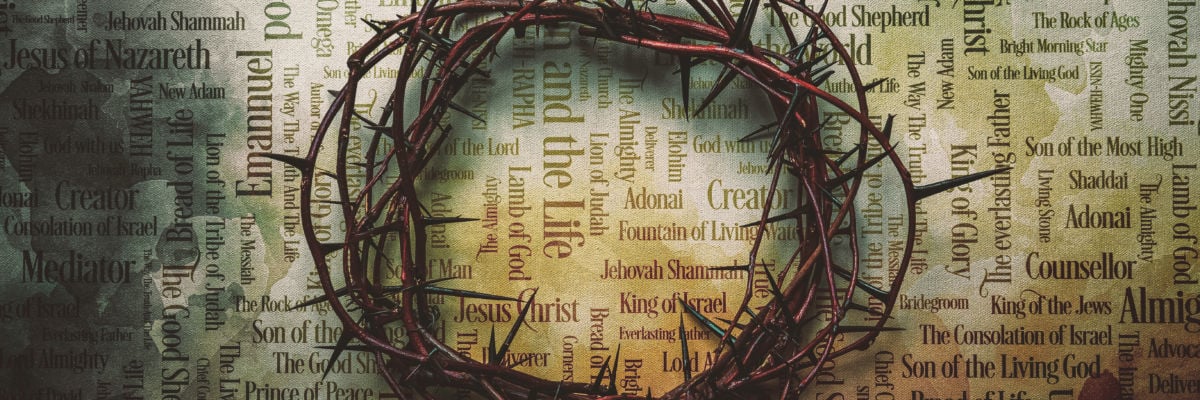
Who is Jesus? And what does he have to do with me?
Those are probably not the questions that rise first in our minds when we think of Lent. Depending on your upbringing, your spiritual temperament, and your general religious convictions, you may be more inclined to think of Lent as a time of spiritual discipline and renewal, a time of focus on church activities, a time of self-examination and improvement, a time of moral purification, or perhaps even a time of ritual preparation to heighten the psychological impact of Easter. And I suppose some of us may simply think of Lent as one more annoying aspect of the liturgical calendar that interferes with our schedules.
Lent is all of those things, including that last one. In a certain way, Lent is supposed to be annoying. It’s built into the name, for us. In most languages, Lent is described more literally as a fast period, or the forty days before Easter, but in English, the word Lent comes from Germanic roots referring to the coming of spring. In other words, just as the world is starting to turn a corner to new life, in church we plunge back into darkness.
And this is putting aside the difficulties of fasting and abstinence. Can I just say I hate giving up things for Lent? Sweets, alcohol, meat, whatever it is. Every time I do it, I feel like a toddler who has been denied his favorite toy—and though I still hate it, and I still feel whiny about it, I know somewhere deep down that I need this opportunity to recognize just how immature I am, just how much I rely on these superficial things of the flesh to make me happy.
Good as all these things are—the discipline and the prayer and the psychological improvement—they always risk missing the point if we’re not careful. And the point of Lent is really that we come again to those two questions I posed at the start: Who is Jesus? And what does he have to do with me?
This morning’s Gospel reading from Mark gives us a brief description of Jesus’ temptation in the wilderness. We read that today because the forty days of Lent find their meaning at least partly in Jesus’ forty days of temptation. We are asked, in Lent, to accompany him, in a certain way, through the wilderness; to confront temptation with him. One of the Lenten prefaces in the Mass speaks about how Jesus was “tempted in every way as we are yet did not sin.”
The forty days also find their meaning in the forty days that Noah spent on the ark as the whole world washed away in the Flood. St. Peter tells us quite clearly that the Flood “prefigured” baptism. Just as God saved Noah and his family in the ark, so baptism saves you and me from the dangers of the world. Notice, by the way, how direct Peter is about baptism’s saving reality. You’re not going to find anything in the New Testament or in the early Church suggesting that baptism is just a symbol.
What Peter invites us to do, in that passage from his letter, is not to make a one-to-one analogical comparison between our lives and the stories of Scripture. It’s not a standardized test question: baptism is to Flood as Lent is to ________. Peter suggests, rather, that Scripture contains for us not information to be decoded, but stories to be lived anew.
That is how the Church views her liturgy and her calendar—and this becomes more and more clear as we progress through Lent toward Easter. We have this opportunity to meet Jesus, again, or for the first time. This is a real meeting, an encounter. It’s not a piece of information or even a quaint story to be remembered fondly—nor is it, to be clear, a story to be re-enacted in a maudlin way. If there’s acting involved, it’s our own. If we represent and remember the life of Christ, we do so because he lives in and through us, because this is how the Church comes to grip with who Jesus is and what he has to do with us. There’s no way of answering those questions in the abstract, as if Jesus were just a principle or a historical figure and not a living Lord. There’s no way of figuring out what Jesus has to do with you and me without giving him the chance to show us personally.
Growing up, I heard a lot of stuff about having a “personal relationship with Jesus” and about “asking Jesus into your heart as your personal Lord and Savior.” You’re probably familiar with that language, as well as the language about people being “lost” or “saved.” It’s a mainstay of American evangelical Protestantism. If you’re like me, you might roll your eyes a bit at it sometimes. But our response to that sort of language—problematic as it can sometimes be—should be not intellectual snobbery, but sincere engagement. The fact is, you and I do need to get saved; we do need a personal relationship with Jesus. And if you think you don’t need to be saved, or you don’t need a relationship with Jesus, you have no business claiming to be a Catholic or a member of the Church.
I got saved in A.D. 33. I also got saved thirty years ago, when I was baptized. I hope to get saved again this Easter. And the only way I know to ask Jesus into my heart is to open my heart to his life as it is laid out to us in the Church’s remembrance, each day in the Eucharist, and in a particularly powerful way in these forty days before Easter. The only way I know to have a personal relationship with Jesus is to have a personal relationship with his body, the Church, and the way that the Church remembers him in its worship.
Don’t try to skip ahead. That’s the hardest part about Lent, and maybe the hardest part about Christianity. We’d rather just get straight to the kingdom of God stuff without all the suffering and martyrdom and sacrifice. We’d rather stop at the Creed without the difficult work of learning how to see Jesus in other people or to show his life to the world. We’d rather contain Jesus in an intellectual or historical box than allow ourselves to participate in his life by giving ourselves to the Church’s liturgy and allowing it to infuse our imaginations and affections.
Who is Jesus, and what does he have to do with me? There’s no shortcut answer. Come and see.



